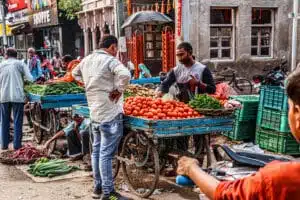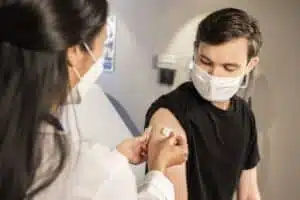A mild case of traveler’s diarrhea typically won’t cause any long-term problems, but it can be quite uncomfortable and can ruin your trip.
How to prevent food poisoning when traveling
We’ve put together a list of actionable tips to help you stay healthy while traveling. By following these five tips, you can avoid food poisoning and enjoy your trip to the fullest!
1. Eat Like The Locals

When traveling, it can be tempting to want to try all the different foods and local cuisine the country has to offer. However, it’s important to eat like the locals do. Stick to local food and restaurants that are popular, as they are likely to have fresher and safer food.
Steaming hot food is also a good way to reduce your risk of food poisoning. The World Health Organization (WHO) says that pathogenic bacteria and viruses are destroyed rapidly at temperatures above 149°F (65°C). This is well below the boiling point of water.
Stale food, cross-contamination, and unclean environments are common causes of food poisoning. So, by eating like the locals, you’ll decrease your chances of getting sick.
Developed countries like Canada and the United States have stringent food safety policies and regulations that are not always followed in developing countries.
2. Avoid Street Food
While street food can be delicious, it’s often not the safest option. Street vendors typically don’t have access to the same level of cleanliness as restaurants do. This increases the risk of food poisoning.

If you’re set on trying street food, only eat foods that are cooked fresh in front of you. Avoid any food stalls that have food sitting out for a while or vendors that don’t use food covers.
Dairy products, undercooked meat, and raw fruits and vegetables can cause foodborne illnesses like Salmonellosis to Listeriosis. Being able to see that the food is cooked properly is a good way to minimize your risk.
3. Be Wary Of Tap Water – Stick to Bottled Water

Staying hydrated is important, especially when you’re traveling in hot climates. However, you should be wary of drinking tap water, as it may not be safe to drink. Tap water in developing countries can contain foreign bacteria and other contaminants that can make you sick.
The best way to stay safely stay hydrated is by sticking to bottled water. You can also boil water to make it safe to drink or use a water filter. If you’re traveling to a country where the water is known to be unsafe, it’s a good idea to get travel insurance that covers medical expenses in case you do get sick. Avoiding ice cubes is also a good way to reduce your risk of getting sick since they are typically made with tap water.
Contaminated water is one of the leading causes of traveler’s diarrhea. Cyclosporiasis, E. coli, and shigellosis are common causes of waterborne illnesses.
4. Wash Your Hands

Washing your hands is one of the best ways to prevent getting sick while traveling. Frequently washing your hands with soap and water will protect you from many of the germs and bacteria that are commonly found in foreign countries.
Hand sanitizer is a good backup option if you can’t get to a sink to wash your hands. Just make sure that the sanitizer contains at least 60% alcohol. According to the Centers for Disease Control (CDC) if your hands are visibly dirty or greasy, alcohol-based sanitizer may not be as effective.
Water may not be readily available or accessible when you’re traveling. Think ahead and carry hand sanitizer or wipes with you.
5. Get Vaccinated

There are some diseases that are more common in certain parts of the world. To protect yourself, it’s important to get vaccinated before you travel.
Some of the vaccines you may need include:
- Hepatitis A
- Typhoid
- Yellow Fever
- Rabies
Your doctor will be able to advise you on which vaccines you need based on your travel itinerary. It’s important to get vaccinated at least four to six weeks before your trip to allow the vaccine time to take effect.
What is food poisoning?
It is important to be able to identify food poisoning so you can take the appropriate steps to get better. Food poisoning is a gastrointestinal illness that is caused by food contaminated by harmful bacteria or viruses. Symptoms of food poisoning can include nausea, vomiting, diarrhea, and abdominal cramps.
It’s always important to be aware of the risks and take the necessary precautions. By following these tips, you can help keep yourself safe and healthy while traveling.
How do you deal with food poisoning while traveling?
If you develop food poisoning while traveling, it’s important to seek medical help. There are a few things you can do to help ease your symptoms.
- Drink fluids to stay hydrated.
- Stick to bland foods that are easy to digest.
- Avoid caffeine and alcohol, as they can aggravate your stomach.
- Get plenty of bed rest.
- Avoid solid foods until your symptoms subside
Proper medical treatment may not always be available, especially when traveling to low income countries. If you are traveling to developing country, it’s important to take extra care to avoid getting sick.
What medication helps with food poisoning?
There are a few over-the-counter medications that can help relieve the symptoms of food poisoning. These include ibuprofen and acetaminophen. Antidiarrheal medication, such as loperamide, is not traditionally recommended since your body needs to expel the toxins. However, if you have severe diarrhea, loperamide can help prevent dehydration.
If dehydration occurs, you may need to be hospitalized and receive IV fluids and/or antibiotics.
It’s always important to speak with a medical professional before taking any medication. They will be able to advise you on the best course of treatment based on your symptoms.
When should you see a doctor for food poisoning?
Food poisoning can sometimes lead to more serious illnesses, such as typhoid fever. If you have any of the following symptoms, it’s important to seek medical attention:
- Blood in your vomit or stool
- High fever that won’t break
- Severe abdominal pain
- Dehydration
- Difficulty breathing
These symptoms can indicate a more serious illness that requires immediate medical care.
What is Traveler’s Diarrhea?
Traveler’s diarrhea, Montezuma’s revenge, the Nile runs, stomach bug, and Delhi belly are just a few of the colloquial names for a gastrointestinal illness that is commonly contracted while traveling. The illness is caused by eating contaminated food or water.
Can you travel if you have food poisoning?
If you get food poisoning, it’s important to consult with your doctor to see if you are healthy enough to travel. Depending on the severity of your illness, you may need to postpone your trip until you are feeling better. If you do decide to travel, be sure to take precautions to avoid getting sick again.
Always pack a few days’ worth of medications in case you get sick while traveling. It’s also a good idea to bring along a copy of your medical records in case you need to seek medical attention while abroad.







